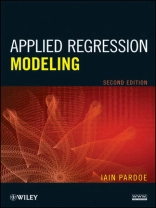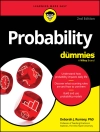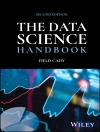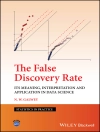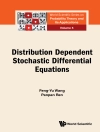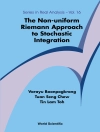Praise for the First Edition
‘The attention to detail is impressive. The book is very well
written and the author is extremely careful with his descriptions .
. . the examples are wonderful.’ —The American
Statistician
Fully revised to reflect the latest methodologies and emerging
applications, Applied Regression Modeling, Second Edition
continues to highlight the benefits of statistical methods,
specifically regression analysis and modeling, for understanding,
analyzing, and interpreting multivariate data in business, science,
and social science applications.
The author utilizes a bounty of real-life examples, case
studies, illustrations, and graphics to introduce readers to the
world of regression analysis using various software packages,
including R, SPSS, Minitab, SAS, JMP, and S-PLUS. In a clear and
careful writing style, the book introduces modeling extensions that
illustrate more advanced regression techniques, including logistic
regression, Poisson regression, discrete choice models, multilevel
models, and Bayesian modeling.
In addition, the Second Edition features clarification
and expansion of challenging topics, such as:
* Transformations, indicator variables, and interaction
* Testing model assumptions
* Nonconstant variance
* Autocorrelation
* Variable selection methods
* Model building and graphical interpretation
Throughout the book, datasets and examples have been updated and
additional problems are included at the end of each chapter,
allowing readers to test their comprehension of the presented
material. In addition, a related website features the book’s
datasets, presentation slides, detailed statistical software
instructions, and learning resources including additional problems
and instructional videos.
With an intuitive approach that is not heavy on mathematical
detail, Applied Regression Modeling, Second Edition is an
excellent book for courses on statistical regression analysis at
the upper-undergraduate and graduate level. The book also serves as
a valuable resource for professionals and researchers who utilize
statistical methods for decision-making in their everyday work.
Содержание
Preface xi
Acknowledgments xvii
Introduction xvii
1.1 Statistics in practice xvii
1.2 Learning statistics xix
1. Foundations 1
1.1 Identifying and summarizing data 1
1.2 Population distributions 5
1.3 Selecting individuals at random—probability 9
1.4 Random sampling 11
1.5 Interval estimation 15
1.6 Hypothesis testing 19
1.7 Random errors and prediction 25
1.8 Chapter summary 28
Problems 29
2. Simple linear regression 35
2.1 Probability model for X and Y 35
2.2 Least squares criterion 40
2.3 Model evaluation 45
2.4 Model assumptions 59
2.5 Model interpretation 66
2.6 Estimation and prediction 68
2.7 Chapter summary 72
Problems 78
3. Multiple linear regression 83
3.1 Probability model for (X1; X2; : : : )
and Y 83
3.2 Least squares criterion 87
3.3 Model evaluation 92
3.4 Model assumptions 118
3.5 Model interpretation 124
3.6 Estimation and prediction 126
3.7 Chapter summary 130
Problems 132
4. Regression model building I 137
4.1 Transformations 138
4.2 Interactions 159
4.3 Qualitative predictors 166
4.4 Chapter summary 182
Problems 184
5. Regression model building II 189
5.1 Influential points 189
5.2 Regression pitfalls 199
5.3 Model building guidelines 218
5.4 Model selection 221
5.5 Model interpretation using graphics 224
5.6 Chapter summary 231
Problems 234
6. Case studies 243
6.1 Home prices 243
6.2 Vehicle fuel efficiency 253
6.3 Pharmaceutical patches 261
7. Extensions 267
7.1 Generalized linear models 268
7.2 Discrete choice models 275
7.3 Multilevel models 278
7.4 Bayesian modeling 280
Appendix A. Computer software help 285
Appendix B. Critical values for t distributions 289
Appendix C. Notation and formulas 293
Appendix D. Mathematics refresher 297
Appendix E. Answers to selected problems 299
References 309
Glossary 315
Index 321
Об авторе
IAIN PARDOE, Ph D, is an independent consultant and also serves on the faculty of mathematics and statistics at Thompson Rivers University, Canada. He has published extensively in his areas of research interest, which include Bayesian analysis, multilevel modeling, graphical methods, and statistics education.
